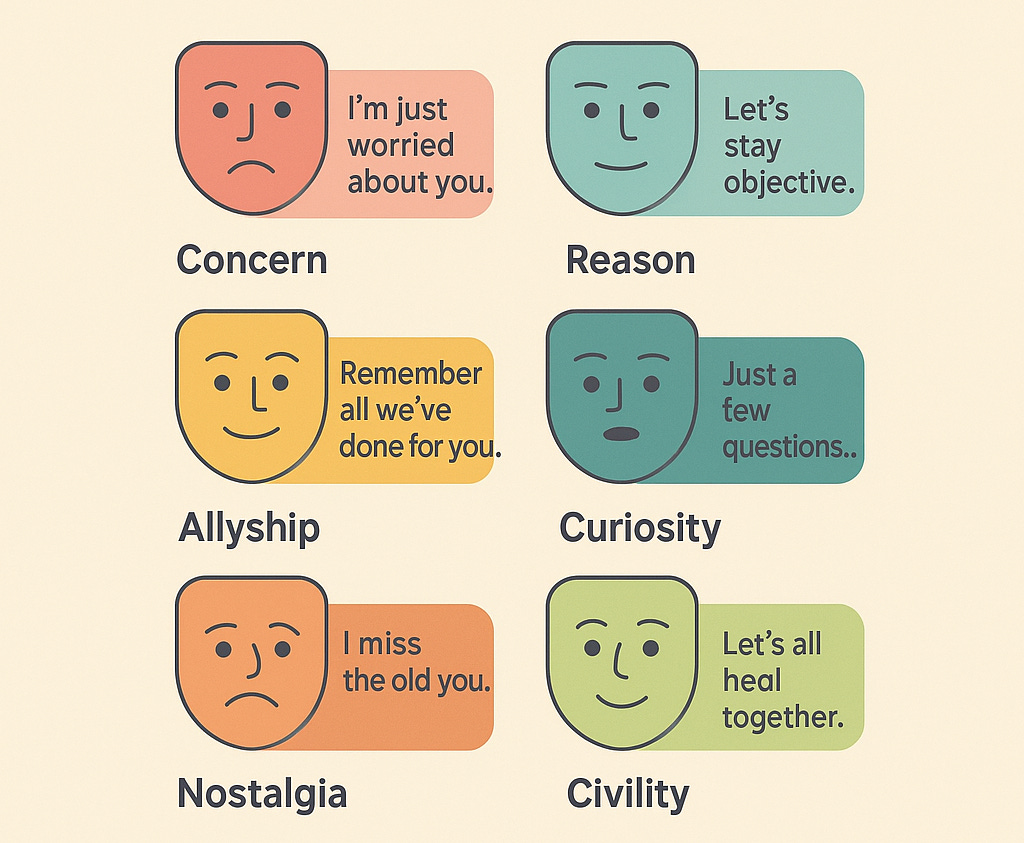When is "I'm Concerned" a Command?
Are they really helping or just trying to take control? Here's how to know.
When open coercion gets pricey (or just looks bad), power doesn’t retire; it changes clothes.
The baton becomes a clipboard, the shout a calm check-in. HR sometimes calls this “support,” parents will call it love, and forum moderators call it civility.
Whatever the label, the aim stays fixed: keep you predictable and grateful while the guiding hand stays spotless. I'll call it soft-power containment—control that sounds like care and looks like compassion yet never loosens its grip.
It moves in three beats.
Interpretation comes first: you’ve barely named the issue before someone reframes it—Let’s be objective, Are you getting emotional? Now the debate is about your tone, not the problem.
Moralizing follows: the boundary you set—I can’t work another weekend—is repainted as selfish or immature, warning bystanders not to side with you.
Finally there’s outsourcing: having cast you as the issue, the same voice hands you the mop—rewrite the email, calm the room, draft the plan. You end up both defendant and janitor while they stroll off looking reasonable.
Because the sequence would feel heavy-handed if declared openly, it hides behind familiar voices, masking itself as different forms of pro-social care.
Concern asks how you’re “really doing” while taking your pulse for dissent.
Reason praises logic but shrinks urgency into childishness.
Allyship reminds you of past favors so gratitude turns into debt.
Curiosity spins your firm no into a dozen gentle questions.
Nostalgia sighs over “the old you.”
Healing wraps conflict in group hugs until responsibility dissolves.
Civility polices tone while leaving the harm untouched.
Each mask is different; all steer you back to obedience without raising a voice.
When a conversation tilts, pause:
Who profits if I keep explaining?
Am I being nudged to quiet the truth or just smooth its edges?
Is yesterday’s goodwill now leverage?
Do I leave lighter or heavier?
If the answers cluster on their side, the velvet glove is squeezing.
Scale the pattern up and whole institutions breathe it.
A discrimination report re-emerges as “coaching” for whoever filed the complaint.
A glossy inclusion campaign sidelines the organizers who push hardest.
Universities convene “listening sessions” on speech while stretching protest permits from one page to twenty.
It almost seems like the warmer their rhetoric, the sharper our audit must become.
Stopping the loop rarely needs fireworks.
One clear reframe is often enough:
“I hear the concern; my boundary stands.”
“The urgency matches the stakes.”
“That unpaid version of me is retired.”
“Let’s talk once roles, not volume, are on the table.”
The hush that follows may prickle, but ownership of the next move is no longer yours.
Your resistance can start small: the 10 p.m. “urgent” ping that waits until morning, the meeting declined because it exists only to soothe someone else’s nerves, the dish left in the sink until energy returns.
Nothing collapses, and each micro-no widens the space where your consent actually counts.
Seeing the human behind the mask can soften your delivery without surrendering your limit. A colleague clings to Reason because conflict scares them; a manager hides behind policy to shield a shaky promotion; a parent confuses vigilance with love.
Remember: understanding those motives is useful for guiding our strategies in navigating the situations, but it never obliges our compliance.
Soft-power persists because it externalizes cost. Institutions bank reputational credit for benevolence while you absorb the stigma of seeming “difficult,” shoulder the unpaid labor of fixes, and lose time to delays that serve power far more than truth. Until those hidden expenses are surfaced—and sometimes refused—the pattern keeps paying dividends.
Two red lines keep my compass true:
I won’t redesign my boundary to cushion someone else’s comfort, and
I won’t perform unpaid emotional triage for the system that caused the wound.
When either line is crossed, my exit is just a matter of hygiene.
A gentle voice can still be a leash.
First it names your feelings, then it files them as faults, and finally it hands you the broom. Naming the pattern loosens its clasp; refusing the labor snaps it.
Care isn’t control, civility isn’t safety, and calm surfaces can hide coercive depths.
Remembering that difference helps you know when dialogue is worth the breath—and when your refusal is the cleanest form of self-care.




This reads like a strategy book for narcissists. It's disgusting. But it is also all empirically true.
Christ, what have we done to ourselves?